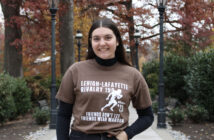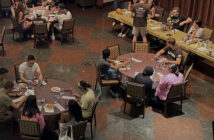Abigail Ubbelohde’s petite frame supports a 30-pound rucksack strapped onto her unisex uniform that fits uncomfortably on her chest and backside. Her hair is pulled back into a low, tight bun under her helmet, and she wears minimal makeup. Her unpainted fingernails grasp a fake rifle as she begins the day’s battle drill.
Gearing up for drills and rising before the sun three days a week is the minimal level of commitment Ubbelohde, ’16, has made to be a part of the Reserve Officers’ Training Corps. ROTC cadets acquire knowledge of military training both in and out of the classrooms, and will eventually be commissioned into the United States Armed Forces as officers post-college graduation.
Ubbelohde was born in New York but grew up on military bases throughout her childhood. Her father served as an Army engineer for 26 years and was on location in Virginia, Germany and Nebraska.
“She always adjusted very easily,” said her mother, Jean Marie Ubbelohde. “She was quick to make friends and settle in and join the new Girl Scout troop or soccer team.”
When planning her own future, Ubbelohde told her college counselor she wanted to follow in her father’s footsteps. Her mother said this was never because her dad pushed her into it, but because she admired his career and lifestyle. Living in new places and exploring new adventures was something Ubbelohde grew to love.
Ubbelohde said she explored the possibility of enrolling at West Point but ultimately decided that joining the ROTC at a college or university was a better fit because it would allow her to have time for extracurricular activities and a social life.
Ubbelohde commits almost every day of her week to ROTC training. Three mornings per week she has physical training and has as a three-hour class in which she learns about the leadership aspect of the ROTC and how to approach different situations. Ubbelohde also added that she has a three-hour lab that takes place outside of the classroom for more hands-on situations. On weekends, she will spend all day training at South Mountain Park and uses the woods there for land navigation courses.
Besides being a member of the ROTC, Ubbelohde is a civil engineering major, a member of the cycling club, plays intramural sports and is an active member in Greek life.
“I really like being involved, so I have been on the executive board of my sorority,” Ubbelohde said. “I was risk manager for a semester, then vice president of standards for a full year, and now I am the new member educator.”
Samantha Brooks, ’16, is a close friend of Ubbelohde’s and has lived with her for three semesters and said her ambition is obvious.
“She has a lot on her plate, but she always manages to get it all done and has a great work ethic,” Brooks said.
Despite Ubbelohde’s busy schedule, she even makes time to attend Brooks’ club field hockey games.
In November 2013, Ubbelohde also took time from her busy schedule to write an article for the Women’s Center about what it is like to be a woman in the Army ROTC and how she embraces femininity. In the article, she said that she has never felt unwelcomed in the program as a woman, but that there are still instances where she feels less feminine because of their measure of uniformity.
Ubbelohde said she thinks she breaks stereotypes by being a part of a male-dominated ROTC program, but continues to bolster the attitude that she should be treated as an equal and a leader regardless of gender.
Although she may not run two miles in 12 minutes, Ubbelohde said she still passes her physical training test with a higher score than some of her male counterparts.
“There is kind of a general connotation about women in the military that they are more manly females and stuff like that, so I think that it makes me want to embrace my feminism more just because I can keep up with the guys,” Ubbelohde said.
Ubbelohde recognizes that the opportunity for women to further succeed in the armed forces is increasing. She said by 2016, women will be allowed to join combat branches in the Army.
When Ubbelohde first joined the ROTC, she said she thought she wanted to go into active duty as part of the United States Army Corps of Engineers. She said being in the Corps of Engineers would get her close enough to the front lines that she would still make a difference without putting herself too close.
After three years of training, she has decided to go into the reserves, which means she will only have to train with the Army for a weekend every month and two weeks out of her summer.
“I still want to do engineering because that’s what my job will be,” Ubbelohde said. “I would have a full-time civilian career and then just do Army reserves on the sides, and that takes care of my commitment to the Army.”
Ubbelohde said she once heard a saying that resonated with her: “You can make ROTC as much as your life as you want it to be.” Although at times she said the stress of balancing her numerous commitments overwhelms her, Ubbelohde puts as much time and effort into ROTC, social commitments and her academics as possible.
“Most situations don’t ruffle her feathers,” Ubbelohde’s mom said. “It’s one of her strengths.”






Comment policy
Comments posted to The Brown and White website are reviewed by a moderator before being approved. Incendiary speech or harassing language, including comments targeted at individuals, may be deemed unacceptable and not published. Spam and other soliciting will also be declined.
The Brown and White also reserves the right to not publish entirely anonymous comments.